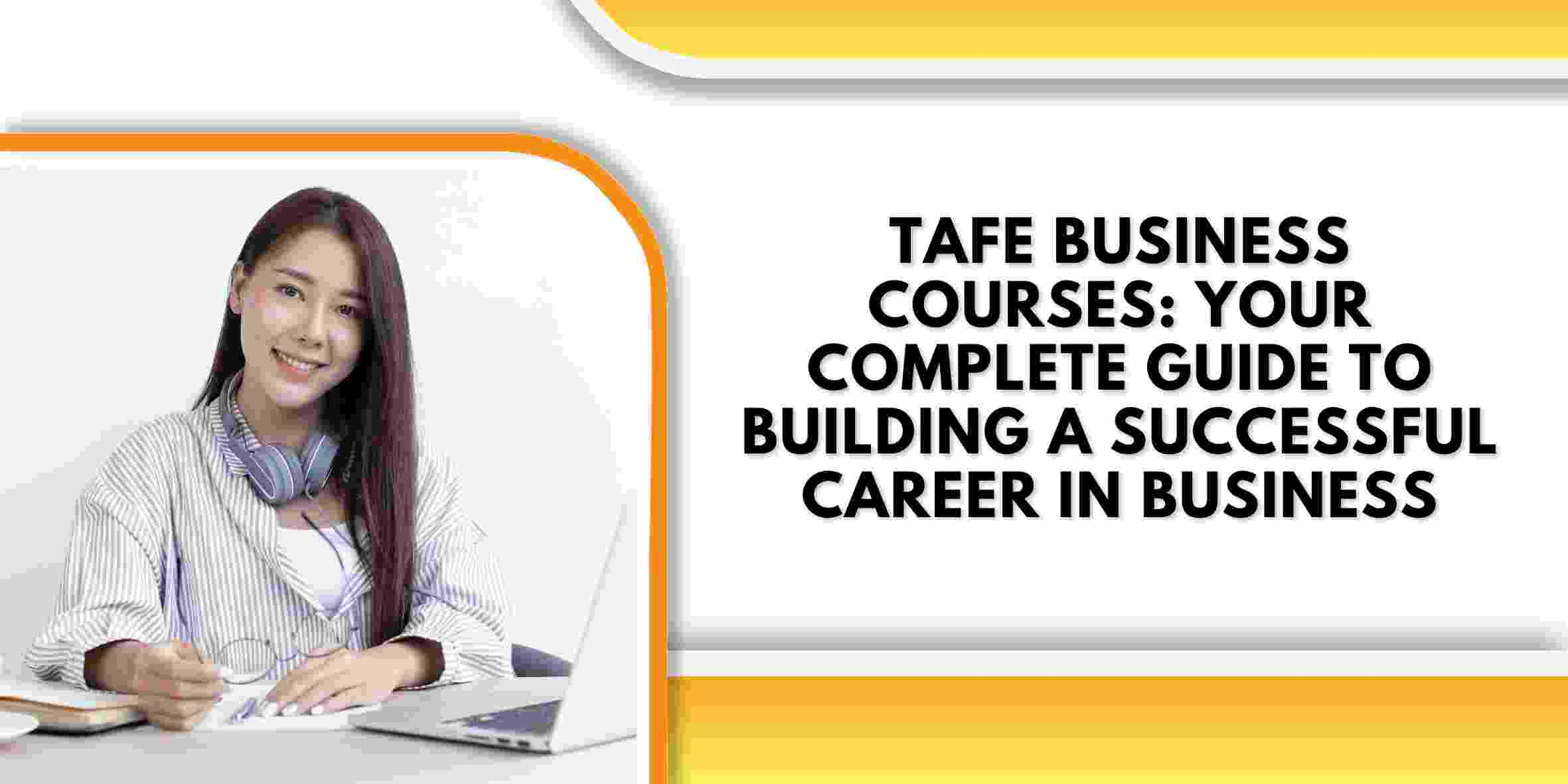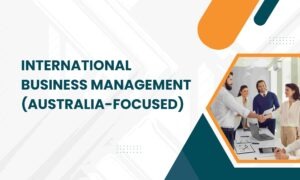Introduction
In today’s competitive and fast-evolving world, pursuing a career in business requires both strategic knowledge and practical skills. Whether you want to become a manager, entrepreneur, bookkeeper, marketer, or financial planner, foundational and advanced business knowledge is critical to your success. In Australia, TAFE business courses provide a highly respected, practical, and accessible pathway to launch or upgrade your career in the business world.
This comprehensive guide will walk you through everything you need to know about TAFE business courses in Australia. From course types and specialisations to delivery methods, entry requirements, career outcomes, and more, this guide will help you make an informed decision and map your future with confidence.
What Is TAFE?
TAFE stands for Technical and Further Education. It refers to a government-funded education system across Australia that delivers vocational training, certificates, diplomas, and advanced diplomas. TAFE institutions are known for:
Practical, job-ready training
Nationally recognised qualifications
Industry-relevant curriculum
Flexible delivery options (on-campus, online, blended)
Pathways to university or employment
TAFE is operated individually by each state and territory, including TAFE NSW, TAFE Queensland, TAFE SA, TAFE WA, TAFE Victoria (Box Hill, Holmesglen, etc.), and more.
Why Choose TAFE Business Courses?
Choosing TAFE business courses is a smart move for many students and working professionals. Here’s why:
1. Nationally Recognised Qualifications
TAFE business courses are accredited and comply with the Australian Qualifications Framework (AQF). This ensures your qualification is recognised across Australia and often even overseas.
2. Industry-Relevant Skills
TAFE institutions work closely with industries to design course content, ensuring what you learn is directly applicable to the job market.
3. Flexible Learning Options
Many business courses at TAFE are available in different formats, including:
Full-time or part-time
On-campus or online
Blended learning
Traineeships or apprenticeships
4. Pathways to University
TAFE diplomas and advanced diplomas often offer credit transfer into university degrees, allowing you to save time and money on your bachelor’s qualification.
5. Job-Ready Training
With a focus on practical training, work placements, and case studies, TAFE prepares you for real-world business challenges.
Popular TAFE Business Courses in Australia
There are a wide range of business-related courses available through TAFE institutions. Some of the most popular include:
Certificate III in Business (BSB30120)
Ideal for: School leavers and entry-level business roles
Duration: 6–12 months
Delivery: Online / On-campus
Career outcomes: Administration assistant, receptionist, data entry operator
Certificate IV in Business (BSB40120)
Ideal for: Those with some experience looking to advance
Duration: 6–12 months
Delivery: Flexible
Career outcomes: Team leader, office supervisor, customer service manager
Diploma of Business (BSB50120)
Ideal for: Aspiring managers and entrepreneurs
Duration: 12 months
Delivery: Full-time/part-time
Career outcomes: Business manager, executive officer, business analyst
Advanced Diploma of Business (BSB60120)
Ideal for: Senior professionals aiming to manage or run businesses
Duration: 18 months
Delivery: Blended or on-campus
Career outcomes: Operations manager, general manager, business strategist
Certificate IV in Leadership and Management (BSB40520)
Focus: Team management, conflict resolution, staff performance
Career pathways: Team leader, coordinator, supervisor
Diploma of Leadership and Management (BSB50420)
Focus: Strategic leadership, operational planning
Career pathways: Department head, project manager, senior supervisor
Certificate IV in Accounting and Bookkeeping (FNS40222)
Relevant for: Those interested in finance, accounts, payroll, or bookkeeping
Career outcomes: Bookkeeper, payroll officer, assistant accountant
Specialisations in TAFE Business Courses
TAFE allows you to specialise in specific areas within the business field. Some popular specialisations include:
Marketing and Communications
Human Resources
Business Administration
Leadership and Management
Retail Management
Entrepreneurship and Innovation
International Business
Project Management
Accounting and Bookkeeping
Work Health and Safety
Small Business Management
Each specialisation equips you with focused knowledge and practical tools tailored to your career goals.
Delivery Modes for TAFE Business Courses
1. Online Learning
TAFE institutions across Australia offer a range of business courses that can be studied entirely online. This is ideal for:
Working professionals
Stay-at-home parents
Rural and remote learners
Online platforms usually include:
Video lectures
Interactive forums
Assignments and projects
Virtual simulations
Tutor support
2. On-Campus
For those who prefer classroom learning, on-campus options are available at most TAFE colleges. These offer:
Face-to-face engagement
Networking opportunities
Group work and presentations
Access to campus facilities
3. Blended Learning
Some courses offer a mix of both online and on-campus sessions, providing flexibility while retaining personal interaction.
Entry Requirements for TAFE Business Courses
Entry requirements vary depending on the course level:
Certificate Level (III and IV)
Year 10 or equivalent education (some may require Year 12)
Basic English proficiency
No prior experience required
Diploma Level
Year 12 or equivalent education
May require completion of a lower-level certificate
Language, literacy, and numeracy test may apply
Advanced Diploma Level
Completion of a diploma or equivalent
Industry experience is often preferred
For international students, additional requirements may include:
English language proficiency (IELTS, TOEFL)
Valid student visa
Overseas health cover
TAFE Business Course Fees and Funding Options
Domestic Students
Course fees range from AUD 1,500 to AUD 12,000, depending on the course and institution.
Eligible students can apply for VET Student Loans (for diplomas and above).
Government subsidies may be available (e.g., Skills First, Smart and Skilled).
International Students
Fees typically range from AUD 6,000 to AUD 18,000.
You must pay full fees and meet visa requirements.
Career Outcomes After TAFE Business Courses
TAFE business qualifications are highly regarded and lead to numerous job opportunities across different sectors. Possible roles include:
Office Manager
Business Development Manager
HR Assistant/Manager
Marketing Coordinator
Project Administrator
Retail Manager
Executive Assistant
Accounts Officer
Payroll Clerk
Entrepreneur
With a business qualification, you can work across industries like finance, retail, education, healthcare, hospitality, government, and technology.
TAFE to University Pathways
Many TAFE business graduates continue their education at university. This pathway offers:
Credit transfer (e.g., 1–2 years of advanced standing)
University entry without an ATAR
Reduced tuition fees
Popular universities that accept TAFE graduates include:
University of Sydney
RMIT University
University of Queensland
Western Sydney University
Deakin University
Griffith University
Top TAFE Institutes Offering Business Courses
1. TAFE NSW
Offers certificates to advanced diplomas
Strong industry partnerships
Work placement opportunities
2. TAFE Queensland
Flexible delivery options
Specialisations in leadership and entrepreneurship
3. TAFE SA
Focus on innovation and management skills
Advanced business simulation labs
4. TAFE Western Australia (North Metro, South Metro)
Practical training and career services
Strong links to WA business sector
5. Holmesglen Institute (Victoria)
Offers dual qualifications
Recognised pathways to Monash University
6. Box Hill Institute
Focus on real-world business strategy
Excellent industry advisory board
How to Choose the Right TAFE Business Course
Choosing the right course involves:
Identifying your career goals
Selecting the right course level
Considering your availability (full-time vs part-time)
Looking at delivery mode (online, blended, campus)
Understanding costs and funding options
Researching institution reputation and support services
Tips for Succeeding in a TAFE Business Course
Stay consistent with your studies and manage your time effectively.
Engage with tutors and ask questions.
Participate in group projects and discussions.
Apply what you learn in practical settings.
Use career services to gain internships or job placements.
Frequently Asked Questions (FAQs)
Q: Are TAFE business courses suitable for beginners?
Yes, TAFE offers entry-level courses (Certificate III and IV) that require no previous experience.
Q: Can I study business at TAFE while working?
Absolutely. Many courses offer part-time or online delivery options.
Q: Are TAFE business qualifications recognised by employers?
Yes, TAFE qualifications are well respected across industries in Australia and abroad.
Q: Can I run my own business after completing a TAFE business course?
Yes. Many students go on to start successful businesses after completing diplomas in business, leadership, or entrepreneurship.
Q: Will I get help finding a job after finishing?
TAFE provides job search support, resume workshops, and connections to employers through career services.
Conclusion
Whether you’re entering the business world for the first time or seeking to climb the corporate ladder, TAFE business courses offer a practical, flexible, and affordable way to equip yourself with the knowledge and skills required for success. With nationally recognised qualifications, strong industry connections, and pathways to higher education, TAFE is a smart choice for anyone serious about business.
Take the next step in your career and explore the wide array of TAFE business courses available near you or online today. Your future in business starts here.
Read more: Work Health and Safety Course: A Complete Guide for Career…







